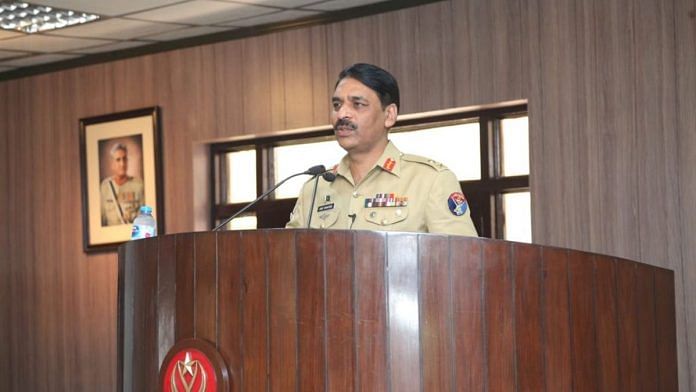Soon after Indian Home Minister Rajnath Singh’s measured and yet resolute interview with Aaj Tak on the Pulwama terror attack aired, Pakistan’s Major General Asif Ghafoor offered a brazen, defiant and unapologetic official response from the army’s Inter Services Public Relations (ISPR).
Nestling amidst Ghafoor’s rhetoric were instructive operational vignettes that offer insights into General Qamar Bajwa and Rawalpindi’s assessment and conviction that India neither had the window nor the stomach to test the escalation ladder. The response was peppered with typically military terms like ‘surprise’, ‘escalation ladder’, ‘full spectrum threat’ and ‘desired end state’, clearly indicating that India’s possible options were being carefully analysed, or even being gamed. Although, there was one difference from Kargil (1999) and Parakram (2002) – this time around there was surprisingly no flashing of the nuclear card or an irresponsible threat from the Pakistan Army even though PM Imran Khan’s foreign minister did threaten to use nuclear weapons in case India attacked Pakistan. It does not indicate a sudden awakening or wisdom regarding the perils of a nuclear face-off with India. It is nothing but a realisation that at a time when Pakistan is being cornered internationally, it is better off posturing as a responsible nuclear weapons power, which it is not.
With India having chosen to wait for an opportune moment to resort to any kind of punitive or retaliatory action, there can be two ways of interpreting the ISPR’s response. Going by India’s track record of not being hard-wired to surprise its adversary over the years — barring a few firm responses like the ones at Nathu La (1967), Sumdorong Chu (1986-87), or the recent surgical/cross-border strikes — Pakistan may well feel that it is now reasonably insulated from a robust Indian military response. On the other hand, PM Modi’s muscular posturing, minimal statements from the Indian military leadership despite having been given a ‘free hand’, relentless pursuit of the JeM and other terrorist cells by the Indian Army’s Northern Command and widespread talk of the Indian Air Force being involved in any military response could well be unsettling for the Pakistan military. Having learned lessons from Operation Parakram where both nations mobilised for war and incurred huge and wasteful expenditure, this time around, the rhetoric, posturing and orchestration of national power to tackle a crisis has assumed proportions of a ‘cat and mouse’ game.
Many Indians believe that Pakistan is in a state of denial over its policy of providing sanctuary and safe havens to Jihadi terrorist organisations. They cannot be further from the truth. Over the last three decades, since Pakistan became the hotbed of state-sponsored terrorism — except for Operation Neptune Spear that eliminated Osama bin Laden and numerous drone strikes in FATA — there has been little chance of targeting terrorists in Karachi, Lahore or Bahawalpur. This is not because there are no safe havens, but because they are all embedded within population centres and virtually impossible to target. Ghafoor’s call to Hussain Haqqani to come and see for himself whether there are any Jaish-e-Mohammed (JeM) safe havens in Bahawalpur reflects this brazen acceptance that outfits like the JeM are the only weapon left in the Pakistan army’s repertoire of asymmetric tools to force the secession of Kashmir and relieve what is made out to be a beleaguered Pakistan from the burden of history.
Also read: Can India hurt Pakistan with new Indus dams or Modi govt hyping old project after Pulwama?
Rambling over global events, deflecting questions about Iran, de-hyphenating the Iran terrorist strikes from the Pulwama attacks, and accusing India of engaging in fifth generation warfare against Pakistan’s youth reflected the country’s uncertainty and incoherence during the press conference.
What then are the major takeaways from the ISPR press conference? First, Pakistan believes that India has lost the window of surprise and that it is ready for military escalation and suitable ripostes. Second, the Pakistan military is unsure of the scale of India’s full spectrum response that ranges from international initiatives, subversion of its youth, economic strangulation and a whole of government approach, much of which falls outside the Pakistan army’s comfort zone. Keeping Pakistan guessing and under all-round pressure, seems to be a worthwhile proposition until India decides how much it is willing to pay for neutralising the JeM and Masood Azhar.
The pieces on the board are moving and Pakistan could be feeling the heat.
Arjun Subramaniam is a retired Air Vice Marshal of the IAF and a strategic commentator.




As lay – occasionally ignorant, but willing to be educated – citizens, we should keep questioning decisions on national security. Why were the intrusions in Kargil not detected earlier ? What did Operation Parakram achieve, was it the right thing to do ? Sometimes, to cover an initial mistake, for no one is willing to acknowledge failure, which carries a political price, blunder into a larger mess. Let there first be honest stock taking of all that went wrong for Pulwama to have happened.
While India continues to demonstrate great patience & tolerance in its response to the recent CRPF attack it seems increasingly clear that terror Groups are operating across the border with Pakistan turning a blind eye. International sanctions are not hitting our neighbors where it hurts most and India needs to up the ante. It is time to flex our influence & get widespread international sanctions, It needs to hurt this time not just ‘tickle’.